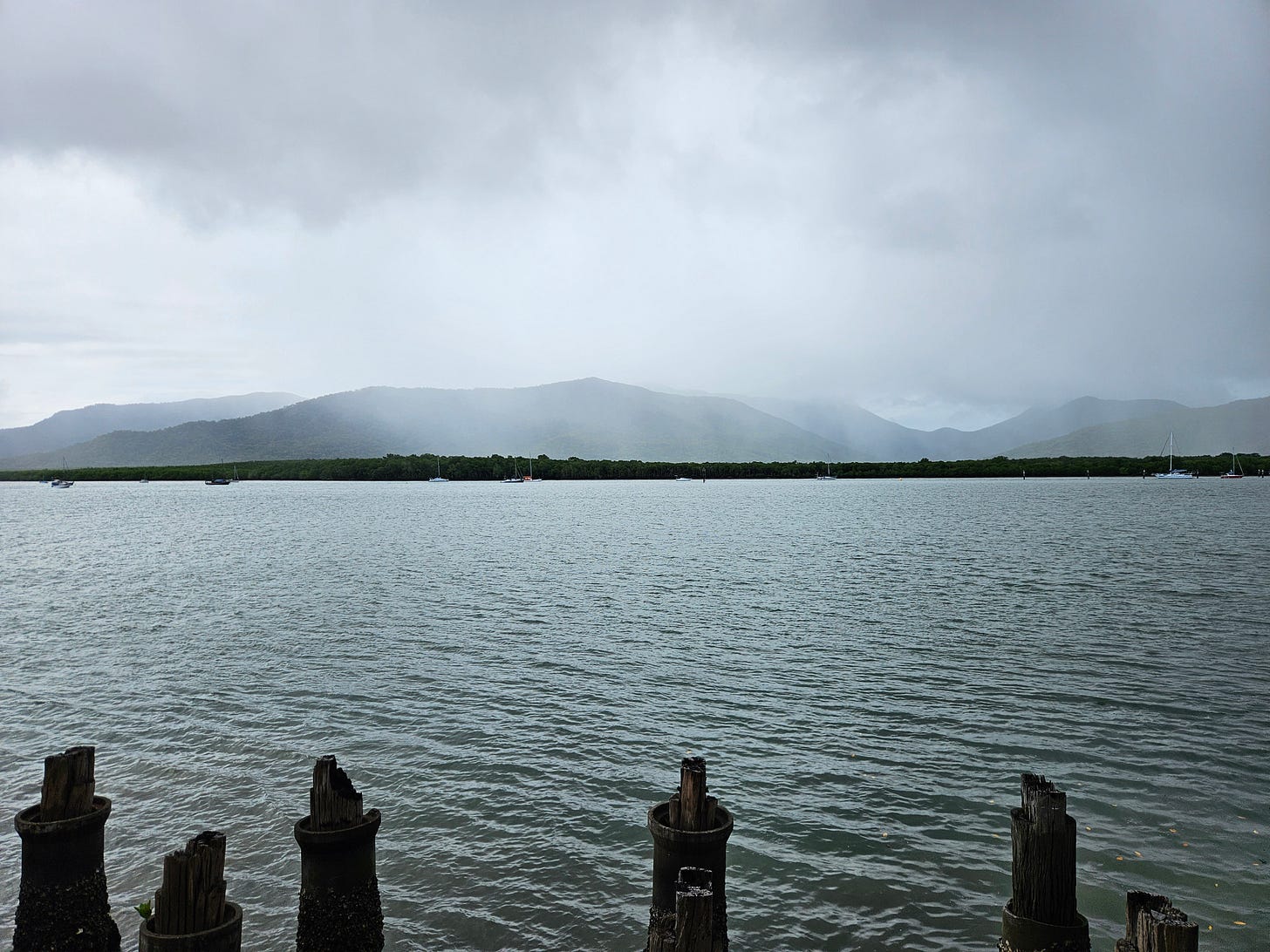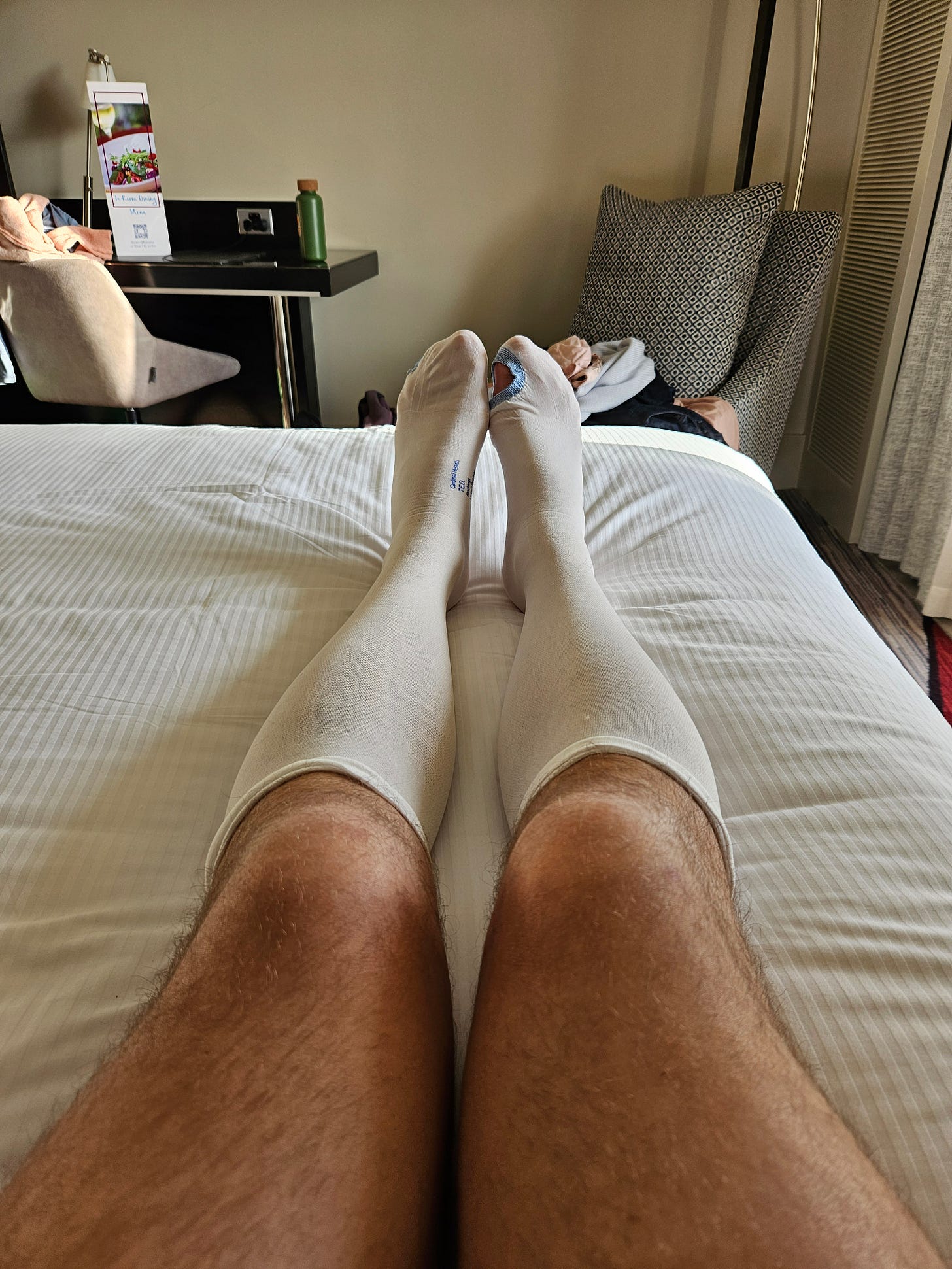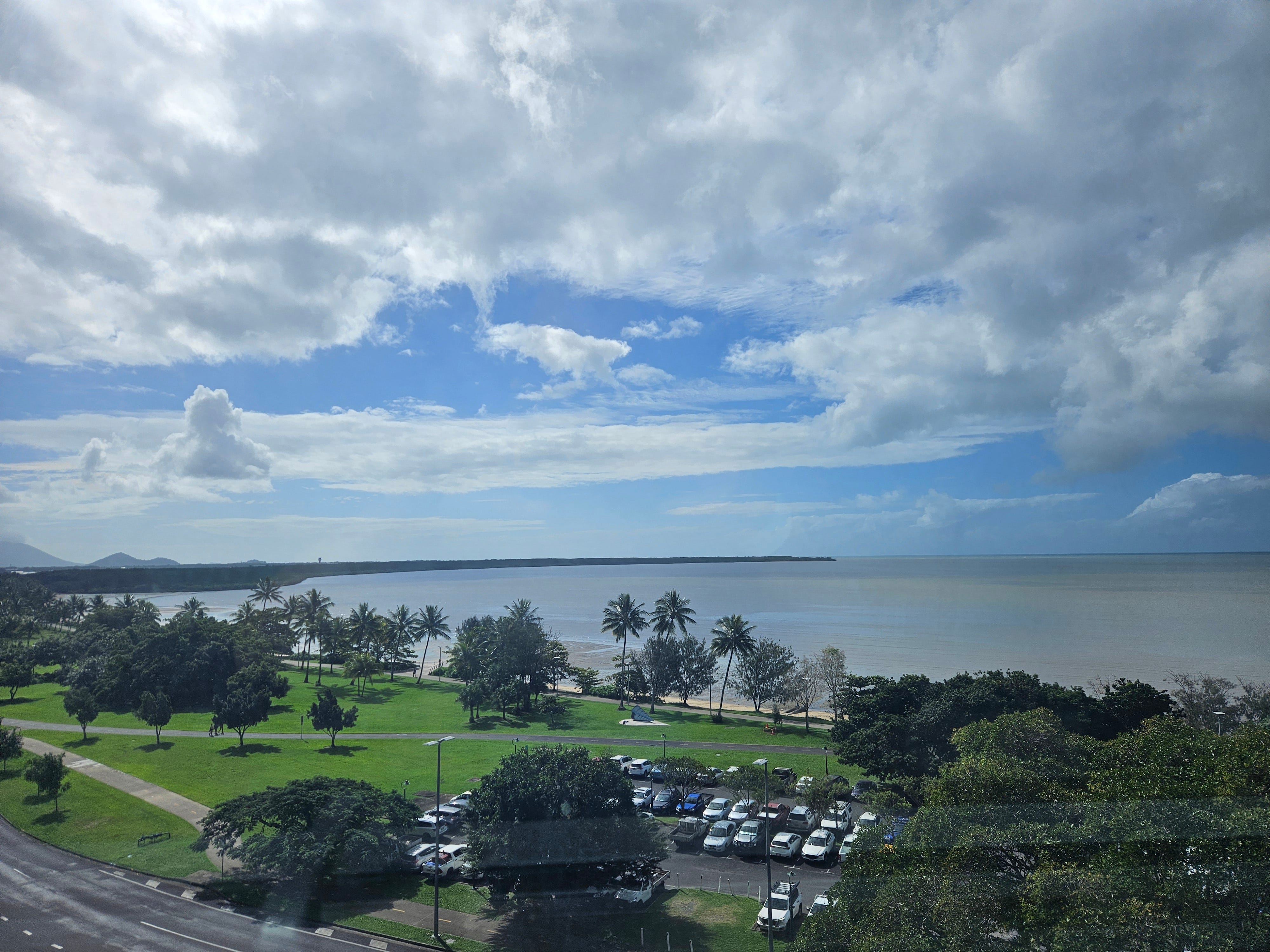I was going to title this "Derailment"
but maybe it's actually the opposite
I spend a lot of my week wondering about what I’m going to write. This digital notebook that is now so engrained in my life means there aren’t many hours that go by when I’m not, at some conscious level, wondering what words will emerge in the span of seven days.
I had a good plan for this week. Inspired by the luscious magical realism of
’s Unsent Letters, along with the superb ongoing and recent epistolary accounts of good friends and , I had every intention of writing something first person singular1. Something fiction. That is what I most crave and is, in all likelihood, why you subscribed. Well, there’s a draft that remains in the drafts. Perhaps it’ll be ready for later this week, if I’m ever to get back to any semblance of my usual rhythm. The seed of a story is burning. That’s enough for me to know its worth observing the germination.But plans can change. And how they did.
I was at a conference this last week, up in the north of Australia, enjoying the tropical warmth of Queensland and a return to t-shirts and shorts. On Monday morning I gave an update on my research to an intimate gathering and was filled with overwhelming relief once it was done2. It was a dual relief: I had done my part and could now network with ease; yet, secretly, I could also retreat to my room at night to engage in this alternative life of writing. That was the plan. I was excited.

Come Monday evening I enjoyed canapes and a few wines. On Tuesday morning, I even managed a run before breakfast3 and then settled into the morning talks. A few hours later, though, things went rather downhill. I developed intense abdominal pain to the point that, totally crippled, I crawled back to my room and found I couldn’t remove myself from bed. I considered it might be food poisoning, but had no other symptoms. By that evening, it was severe enough that I checked myself into the emergency department of the nearby hospital. After a two hour wait, I received a hefty slug of the good stuff: morphine. The fact it barely touched the pain should have raised some internal alarms, but I was given a bed and kept under observation and started to feel better purely through being in the safety of professional help.
I was discharged.
Three hours later, in agony once more, I struggled back into a taxi and—oh, hello—I’m back in Emergency, writhing around in the plastic chairs as others came and went. Another ten hours passed. More blood tests. Urine tests. An extensive ultrasound.
All systems are normal. You’re good to leave. It’s probably gastritis.
Except they weren’t. I wasn’t. That’s not what it was.
The following day, my body all but gave in. A close colleague called on a fellow doctor at the conference who assessed me in my room and, suspecting this had all the hallmarks of an obstructed bowel at risk of rupture (my appendix had been removed as a child, so it wasn’t that), said I needed to get back to the hospital and demand a CT scan. As it happens, when you show up for the third time at Emergency in less than 48 hours they start to take you seriously. I was seen within minutes and sent for a CT scan4, which showed “very concerning signs of fluid build-up in your abdomen and something very wrong with your intestines.” This was followed by a, “We’re going to prep you for immediate surgery.”
It’s a strange thing feeling the relief of having an answer to what’s wrong whilst simultaneously hearing that you may come out of surgery missing parts of, or all of, your bowels. I won’t lie and say I wasn’t nervous. Actually, I was terrified. Being wheeled through the midnight corridors of a surgical ward has a surreal quality. It was like a zombie movie, only without the zombies. The hallways, dark and metallic and with a strange lunar hue, echoed as I was pushed through a set of double doors and into the operating room. The table was there, waiting. I was on fate’s railway and there weren’t any other stops.
Undressing into a gown, I spoke honestly of my worry to the anaesthesiologist. Only twice in my life have I experienced the time-travel that surgical sedation elicits. Being on the immediate sides of that breach is, I find, fascinating: you know you’re about to leap, and then you’re suddenly there. I have and had no fear of that, but I was presented with a very real fear of the unknown. How was I going to emerge from this? What were they going to find? As I stretched out onto the operating table, my legs rattled. I was shaking. With fear, with cold, with a body battling unrelenting pain. I don’t remember the anaesthesiologist’s name. I wish I did. Connecting me to a drip, he reassured me, joked with me. With a sly wink, he told me he’d slipped me something to calm my nerves and make me happy. I asked him what. Fentanyl, he said, smiling. The euphoria was immediate. There’s good reason this stuff has wrecked the US and elsewhere. I sank and floated as an oxygen mask settling around my mouth. They could do whatever they wanted. I didn’t care. I just slipped along, rode the wave, swam in the shores of bliss. There were voices, the surgeon was there now, there were a lot of people—
—and then I was awake in recovery, groggy and a little sore but immediately aware the pain was gone, being told by the recovery nurse that everything was well, they’d separated the adhesion that had—for reasons still unclear—spontaneously formed in my small intestine and had drained the fluid build-up, dampened the inflammation, patched me up. All through laparoscopy. Nothing had been removed. I managed a look under my gown, felt around my sides. I was intact.
I say all this not to garner sympathy. I’ve debated what and whether to write. I thought perhaps I would let it go, beyond a nod or message of what happened to several friends. But I think I need to write about it, albeit briefly, just to acknowledge it and mark it and make sure I don’t let it go. If it wasn’t for my colleague’s advice, the proximity of a hospital, the skill of surgeons and power of anaesthetic and etc. etc., then, well, who knows. I guess it could have gotten very serious. That’s what I’m told. But there are others far, far more unfortunate than I. Those who aren’t so lucky or who don’t have access to even a modicum of proper healthcare, free or otherwise. I find this distressing and upsetting, especially since it is a vast majority of the world.
So yeah, I’ve been wondering on what to write. I thought this ordeal was going to be derailment. A setback. Oh no, I can’t exercise for 4 weeks! What will I do? Pfff. Get over yourself. I’m alive. I get to spend time with my wife and friends, I get to once again appreciate everything when really that’s all I should be doing anyway every single moment of my days. So it’s not a derailment. It’s very much a rerailment, the tracks winding their way into possibilities unknown.
I have three keyholes in my abdomen now. As my fingers slide across these strange new grooves of scar and skin, I’m left with a permanent reminder, a triangulation of points that lead within. Beneath is a place I cannot see—a mysterious vault, tender and alive yet intrinsically me. Only the surgeon saw what was there. I wonder what stories he glimpsed. I wonder which he might have set free.
Along with my reading of The Book of the New Sun vol. 2, I have, by night, been re-immersing myself in pages of Murakami.
I’ve given enough talks to not really care, but this crowd contained so many world experts—to be clear, that does not include myself—that I was certainly intimidated.
Hey, no hangover!
If you’re at all squeamish, don’t read this. After several days of many cannulas, the one they inserted into my left arm for the contrast dye got bent and, erm, upon commencement of the scan caused the dye to flood into my bicep. It’s hard to accurately describe the acute heat-filled pain that caused, along with the alarm of seeing my bicep do involuntary curls as contrast dye was pumped into my tissue. I screamed. They stopped the pump, stabbed me elsewhere, loaded me up for a second try. That worked just fine, though I was a shaking mess by then.




Glad it’s over and you’re well on your way to a full recovery, Nathan. Life is a maze with infinite turning points, each requiring a decision by you and by others around you. And things can really change in a heartbeat. Take it easy and slow, for a while — this may be a writer’s paradise, albeit in the midst of a certainly suboptimal situation under pretty much any other respect. But hey, you’re here and well and grateful and generous as always to share. Having said all this, I’m humbled by your mention of my work as inspiration, and I think you might have a super story right there, while you were absent and they were operating on you. Where did you go? Who did you meet? How did you get called back to consciousness? So good to hear you’re well, my friend.
Dude, glad you’re alright. I had a similar experience once and it got me thinking along the same lines as you in terms of gratitude.
Like, if it had happened to me 100 years ago, I probably would have just died.
Medical technology is amazing.